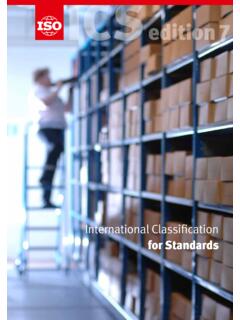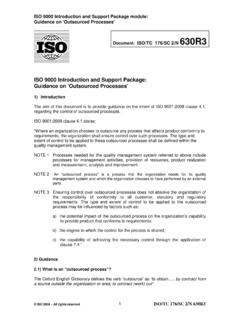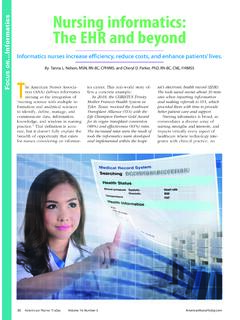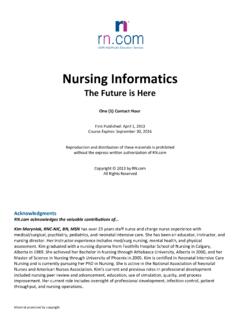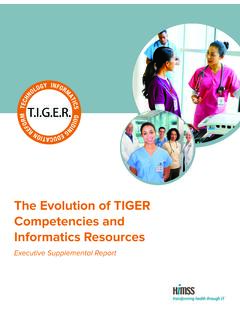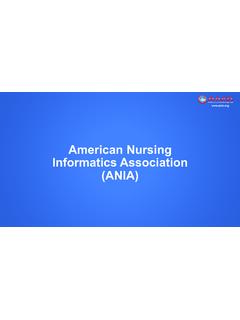Transcription of ISO and health
1 ISO and healthGreat things happen when the world are an independent, non-governmental are a global network of national standards bodies with one member per are not for profit : selling our standards allows us to finance their development in a neutral environment, to maintain them and to make new job is to make International Standards. We are coordinated by a Central Secretariat in Geneva, are ISO, the International Organization for StandardizationISO provides a platform for developing practical tools through common understanding and cooperation with all stakeholders. 22 500* International Standards100new standards each month249* technical committees164* members * March 201926*technical meetings were in progress, on average, each working day of the year somewhere in the world4 More than 1 400 ISO health standards help to ensure these aspirations are do we need ISO standards for health ?Access to : health services quality care safe medical practices and equipment cost-effective solutions has become the expected norm of today s society.
2 Good health and well-being are one of the UN Sustainable Development Goals, the United Nations new roadmap to improve people s livesby 2030. ISO works through its network of national members to bring together the foremost international expertise and disseminate it standards for health help ensure that individuals and communities receive the quality of care they deserve. By implementing ISO standards, organizations and companies make a proactive commitment to the principles of quality, transparency, accountability and standards make it easier to compare health services, exchange information, aggregate data and safeguard the privacy of an individual s health .* Source : standards are strategic tools that help businesses gain a competitive advantage through products and services that are safe, reliable and standards provide tools to assess and evaluate conformity, affording a solid technical base for health legislation. ISO standards seek to harmonize the healthcare sector to reduce costs, thereby facilitating access to care and increasing health standards ensure consistency.
3 Healthcare providers, national governments and manufacturers benefit from not having to comply with multiple specifications and requirements for different markets. Regulators can rely on trusted internationally harmonized solutions, which are continually reviewed and improved to provide the technical foundation for market-friendly regulations that meet citizens standards safeguard consumer interests by ensuring good-quality care and safe and reliable products and services. Who benefits from ISO standards for health ?IndustryRegulatorsConsumers8 What health sectors does ISO cover ?Standardization in the field of health covers a variety of sectors, for instance :Dentistry OpticsEquipment for transfusionsInfusions and injectionsMedical devices SurgeryAssistive products Sterilization of healthcare products health informatics Traditional Chinese medicineImplants for surgeryHealthcare organization management9 What standards does ISO have for health ?
4 Below is a selection of ISO technical committees dedicated to improving the safety and quality of healthcare management and risk managementISO standards for health help to ensure the safety and effectiveness of health practices and products through proficient quality and risk management. ISO/TC 210, Quality management and corresponding general aspects for medical devicesThis health committee develops standards for the application of risk management to the design and manufacture of medical devices. It also covers small-bore connectors used to connect medical devices, such as tubing, syringes and other accessories delivering fluids and gases for patient care. ISO/TC 212, Clinical laboratory testing and in vitro diagnostic test systemsThis health committee provides a practical approach to reducing error in medical laboratories through risk management and continual improvement. Current standards cover laboratory safety, analytical performance and quality assurance.
5 Future areas of focus include the management of biorisks, risks originating from the handling of biological agents and devices ISO/TC 194, Biological and clinical evaluation of medical devicesThis ISO technical committee standardizes biological test methods for the evaluation of medical and dental materials and devices prior to their release for commercial use. ISO/TC 198, Sterilization of healthcare productsThis health committee lays down the requirements for sterilization processes, sterilizing equipment, washer disinfectors and ancillary products used to ensure the satisfactory sterilization of healthcare and photonicsOptics and photonics* are enabling technologies that not only influence information technology, telecommunications, lighting and energy, but also have innovative applications in healthcare and life sciences through advanced laser technology and automation. ISO/TC 172, Optics and photonicsThis health committee helps develop uniform terminology and test methods for handling safety issues properly.
6 * ISO standards in this field span a range of sectors from highly sophisticated systems down to simple semi-finished products or components, such as medical/surgical lasers, bar-code readers, sensors and other electro-optical instruments. 12 Oral health ISO/TC 106, DentistryA major sector in ISO is healthcare technology. Standardization in oral healthcare includes terminology, methods of test and specifications applicable to materials, instruments, appliances and equipment used in all branches of implants ISO/TC 150, Implants for surgeryThis health committee sets out specifications and test methods for the safety and effectiveness of surgical implants that are inserted into the body for diagnostic or therapeutic organization managementHealthcare services management involves a lot of moving pieces, including health facilities, medical equipment, staff and patients. Good organization is essential to managing these multiple and interdependent functions.
7 ISO/TC 304, Healthcare organization managementDrawing on best practice and advances in scientific research, this health committee develops standards for the classification, terminology, nomenclature, management practices and metrics covering non-clinical operations of healthcare entities. It is currently working on three standards covering the vocabulary of healthcare management (ISO 22886), hand hygiene practices (ISO 23447) and patient-centred staffing (ISO 22956).14E- health technologiesThe standardization of health informatics means that data can be collated more efficiently and shared more effectively. ISO/TC 215, health informaticsThis health committee strives to achieve compatibility and interoperability between independent systems in the use of health -related data, information and knowledge to support all aspects of the health laboratory testing and in vitro diagnostic test systemsQuality management and corresponding general aspects for medical devicesSterilization of healthcare productsOptics and photonicsDentistryImplants for surgeryHealthcare organization managementHealth informatics Biological and clinical evaluation of medical devicesISO/TC 215 ISO/TC 212 ISO/TC 210 ISO/TC 198 ISO/TC 172 ISO/TC 106 ISO/TC 194 ISO/TC 150 ISO/TC 30418 Are there other ISO/TCs related to health ?
8 ISO/TC 76, Transfusion, infusion and injection, and blood processing equipment for medical and pharmaceutical use ISO/TC 84, Devices for administration of medicinal products and catheters ISO/TC 94, Personal safety Personal protective equipment ISO/TC 121, Anaesthetic and respiratory equipment ISO/TC 157, Non-systemic contraceptives and STI barrier prophylactics ISO/TC 168, Prosthetics and orthotics ISO/TC 170, Surgical instruments ISO/TC 173, Assistive products ISO/TC 181, Safety of toys ISO/TC 249, Traditional Chinese medicine ISO/TC 283, Occupational health and safety managementGet involved !Would you like to have your say on the rules governing world trade ?Do you want to know which standards can benefit your business ?Do you have a good idea for a much needed standard ? Contact the ISO member in your country : @19 More information ?ISO Website Website section : standards in action magazine videos us on Twitter us on Facebook us on GooglePlus Organization for StandardizationISO Central SecretariatChemin de Blandonnet 8CP 401 1214 Vernier, GenevaSwitzerlandThe symbol on the cover comes from the International Standard ISO 7000, Graphical symbols for use on equipment Registered symbols.
9 It is used on medical devices or blood process applications to indicate that the device or process application includes a system dedicated to the collection of samples of a given substance stored in this medical device or blood on our Online Browsing Platform at ISO, 2019 All rights reservedISBN 978-92-67-10975-6


